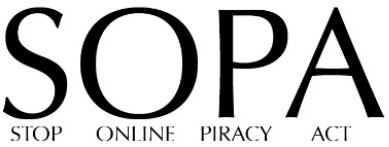What does the Stop Online Piracy Act (SOPA) mean to you, if you’re in public relations? Nothing good. For a business increasingly dependent on social media, whose arsenal has always relied upon viral, user-shared content, and whose aim is to get everyone talking about their clients, SOPA poses a significant threat.

If it is somehow possible that you have not yet read about SOPA – an unlikely scenario, given that reading this blog makes you an able consumer of online content, and the SOPA debate has dominated the web for the last several weeks – the proposed legislation is available here. Put simply, SOPA would allow for court orders to be issued against websites accused of piracy or other illegal activities, potentially requiring (among other things) that ad networks halt their business with said sites, search engines de-link said sites, payment processors cease accepting payments for said sites, and more. In essence, a site accused of facilitating piracy can immediately lose all access to business-vital functions such as site discovery, content sale, and ad revenue.
Everyone whose livelihood is rooted in the gaming industry can likely agree that piracy is terrible and its practitioners should be punched in the head. Trying to solve the issue with SOPA, however, opens the door to entirely new problems, many of which may disrupt your life as a PR professional (or a company that uses PR to promote itself).
Whether you believe SOPA is a well-crafted piece of legislation or not, a likely result will be a decrease in the sharing of content by ill-informed users. Some citizens may not have trouble distinguishing between fair use and piracy, but others may find they are reluctant to share media online for fear of tripping over the new law.
Imagine the effects if you happen to be a game publisher, eagerly releasing your latest trailer or screenshots. Where once you would look forward to your fans enthusiastically reposting those images and videos on blogs, message boards, and social media channels, now you may only reach as far as the audience on your own website. Users may become increasingly paranoid about sharing content without your explicit consent, and content-sharing sites may impose overly draconian guidelines in an effort to keep themselves safe.
Imagine the effects if you happen to publish or develop an MMO title, whose continued existence depends on the cultivation and growth of an enthusiastic community. SOPA will let you look forward to a decrease in user-generated content such as fan art, fan-operated wiki pages, fan-written FAQs, and more, as users become wary about creating content based on others’ IP, and sites become reluctant to host such content.
Online entities are weighing in, en masse, about their SOPA concerns, including Reddit, Wikipedia, the ESA, Twitter, Google, and many more. If nothing else, this should signal how far-reaching and vital an issue this is, and you owe it to yourself and your business to get informed.
One of the primary purposes of PR, whether it’s via the traditional press release and review process, or via social media, viral creative works, and other non-traditional means, is to get people talking about you/your clients. Users who are made aware of a product or service will share that knowledge with others, and generate that ever-elusive “buzz” that can help drive sales. Anything that serves to intimidate people out of sharing those thoughts online, either by accident or by design, presents a problem – and, whether you support SOPA or not, you need to be prepared for those changes, should they come to pass.

[…] out the TriplePoint blog for some PR considerations and good old fashioned commentary about SOPA from one of Frisky’s finest. Here’s […]
[…] This article is written by Jesse Henning and our friends at TriplePoint PR Maikel De BakkerGaming since 1978. Organizer of gaming events since 1984. Founder of Nisute Europe (2004). Member of the OGC (Old geezers Club).Website – Twitter – Facebook – More Posts […]